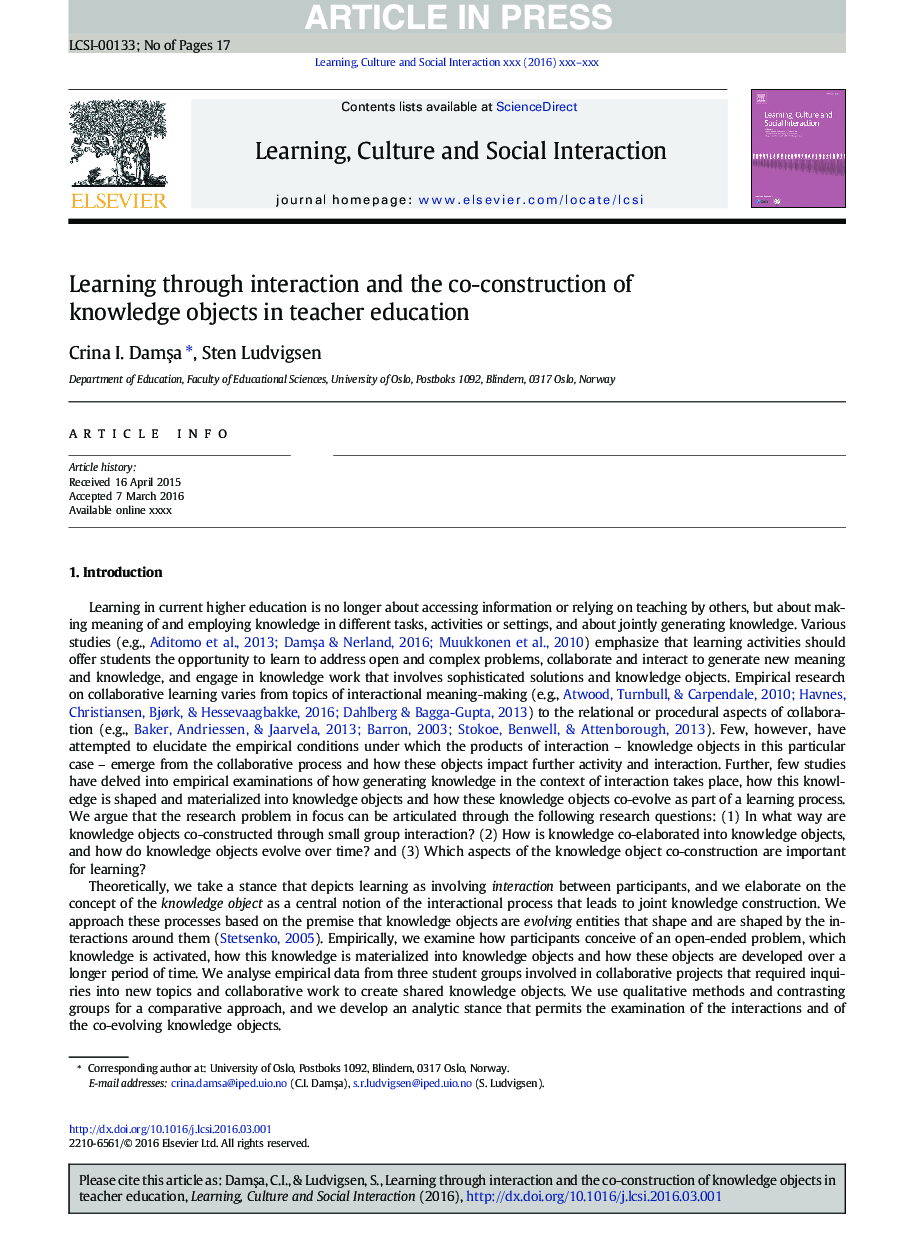| کد مقاله | کد نشریه | سال انتشار | مقاله انگلیسی | نسخه تمام متن |
|---|---|---|---|---|
| 4939891 | 1436348 | 2016 | 17 صفحه PDF | دانلود رایگان |
عنوان انگلیسی مقاله ISI
Learning through interaction and co-construction of knowledge objects in teacher education
ترجمه فارسی عنوان
یادگیری از طریق تعامل و همکاری ساختار دانش در آموزش معلمان
دانلود مقاله + سفارش ترجمه
دانلود مقاله ISI انگلیسی
رایگان برای ایرانیان
کلمات کلیدی
الگوهای تعامل، اشیاء دانش، یادگیری مشارکتی، مسیرهای یادگیری، گروه های مخالف،
ترجمه چکیده
این مقاله یک مطالعه تجربی از یادگیری آموزگاران دانش آموزان از طریق پروژه های مشترک، پروژه های کوچک و کار بر روی اشیاء دانش مشترک را ارائه می دهد. هدف این است که بدانیم که چگونه دانش های اجرایی، مانند مواد آموزشی و آموزشی، بوسیله تعامل دانش آموزان بوجود می آیند، از طریق همکاری ساختگی تکراری توسعه می یابند و در فرآیند یادگیری نقش دارند. این مطالعه با استفاده از یک روش تحقیق مبتنی بر طراحی و بازسازی سه دوره در یک موسسه آموزشی انجام شد. تجزیه و تحلیل ها تمرکز بر فعالیت های سه گروه دانشجویی در انجام پروژه های همکاری، که آنها را به منظور شناسایی و حل مسائل باز در مدارس تعلیم و تربیه خود، با ایجاد شیء های دانش مشترک مشترک از انواع مختلف تمرکز داشت. داده های تعامل و اشیاء دانش ایجاد شده توسط گروه ها با استفاده از روش های کیفی، با توجه به نوع تعامل، جذب ایده ها و مفاهیم و همکاری آنها مورد تجزیه و تحلیل قرار گرفت. یافته ها نشان می دهد الگوهای در تعامل با روش های فردی، گفتاری و شی گرا برای همکاری. در درون دوم، تعامل ماهیت معرفتی، پذیرش استراتژیک مفاهیم، همکاری با برداشت بینش مشترک و بازخورد سازنده به عنوان مهمترین جنبه های یک فرآیند همکاری ساختمانی موفقیت آمیز به نظر می رسد. این مطالعه رابطه بین تعامل اجتماعی دانش آموزان و ساخت و ساز شیء را توضیح می دهد و پشتیبانی از درک پیچیده تر از نحوه کار مشترک در اشیاء دانش را می تواند آموزش را در همکاری آسان کند.
موضوعات مرتبط
علوم انسانی و اجتماعی
روانشناسی
روانشناسی رشد و آموزشی
چکیده انگلیسی
This article presents an empirical study of student teachers' learning through collaborative, small group projects and work on shared knowledge objects. The aim is to understand how knowledge objects, e.g., teaching and learning materials, emerge through students' interaction, are developed through iterative co-construction, and play a role in the learning process. The study employed a design-based research approach and involved the re-design of three courses in a teacher education institution. The analyses focused on the activities of three student groups conducting collaborative projects, which required them to identify and address open-ended problems in their placement schools, by means of developing shared knowledge objects of various kinds. Interaction data and knowledge objects generated by groups were analyzed through qualitative methods, with a focus on the types of interaction, the uptake of ideas and concepts, and their co-elaboration. The findings reveal patterns on interaction featuring individual, discourse-based and object-oriented approaches to collaboration. Within the latter, interaction of an epistemic nature, the strategic uptake of concepts, the co-elaboration based on shared insights and constructive feedback appear as the most important aspects for a successful co-construction process. The study illustrates the relationship between the students' social interaction and object construction and elaboration, and provides support for a more sophisticated understanding of how joint work on knowledge objects can facilitate learning in collaboration.
ناشر
Database: Elsevier - ScienceDirect (ساینس دایرکت)
Journal: Learning, Culture and Social Interaction - Volume 11, December 2016, Pages 1-18
Journal: Learning, Culture and Social Interaction - Volume 11, December 2016, Pages 1-18
نویسندگان
Crina I. DamÅa, Sten Ludvigsen,
